RheinEnergieStadion: FC Cologne
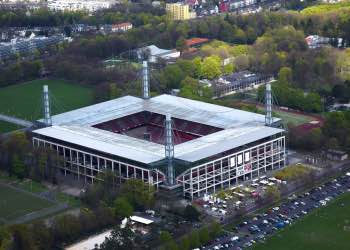
Fynn Korsen / Flickr.com
1. Fußball-Club Köln 01/07 e. V are perhaps better known as FC Köln, in German, or FC Cologne in English. They play their games at the RheinEnergieStadion, a football ground formerly known as Müngersdorfer Stadion but renamed because of sponsorship. The German side was formed in 1948 when two different clubs were merged. Kölner BC dated back to 1901, whilst the wonderfully named Spielvereinigung 1907 Köln-Sülz was formed in 1907 and merged with Fußball Club 1908 Hertha Sülz in 1919. If that all sounds a little bit complicated then don’t worry about it. The most important to know is that the club has been called FC Köln, to use the German name, since 1949.
Equally as complicated is the history of the stadium that the club plays its football in. We’ll tell you about it in more detail in the ‘Stadium History’ section later, but for now you should be aware that the ground that they play in now is a completely different one to that which first opened its doors in 1923. That ground was demolished and rebuilt in the 1970s, with the stadium that replaced it being completely renovated in 2004 to make it into the one we know now. The club is actually the fourth largest in Germany, having enjoyed numerous successes over the years. That includes two Bundesliga titles in both 1964 and 1978.
Stats
| RheinEnergieStadion Stats | |
|---|---|
| Year Opened | 1923 |
| Capacity | 50000 |
| Average Attendance | 49571 |
| Record Attendance | 76000 (Germany v Austria (1953)) |
| Pitch Size | 105 x 68 (7140) |
| Former Name | Müngersdorfer Stadion |
| Owner | Kölner Sportstätten GmbH |
| Sponsor | RheinEnergie AG |
| Clubs Hosted | Kölner BC 01, SpVgg Sülz 07, 1. FC Köln, Cologne Centurions, Germany national football team |
| First Fixture | Germany v Netherlands (20/11/1927) |
| FC Cologne Stats | |
|---|---|
| Year Founded | 1948 |
| Nickname | Die Geißböcke (The Billy Goats) |
| Club Mascot | Hennes |
| Rivals | Borussia Monchengladbach, Schalke, Bayern Munich, Bayern Leverkusen |
| Kit | White (Home) / Red (Away) / Black (Third) |
| Training Ground | Geißbockheim |
| Shirt Sponsor | REWE |
| Team Owner | 1. FC Köln GmbH & Co. KGaA |
| Record Goalscorer | Hans Schäfer (304) |
| Record Appearances | Wolfgang Overath (542) |
RheinEnergieStadion Photos
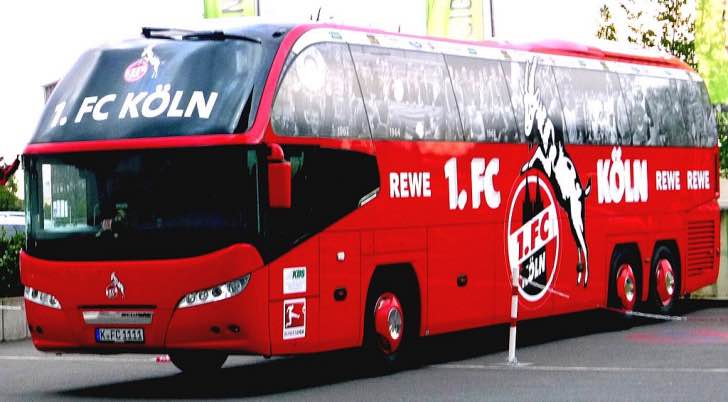
By The weaver (Diskussion) 16:37
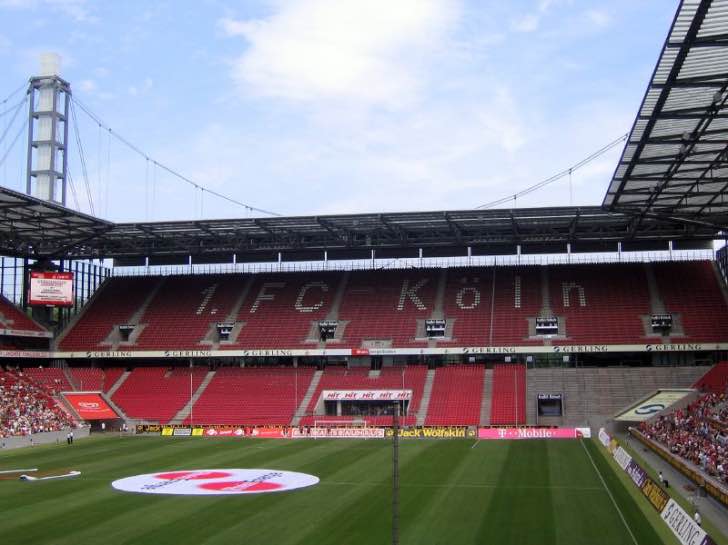
PROsavv / Flickr.com
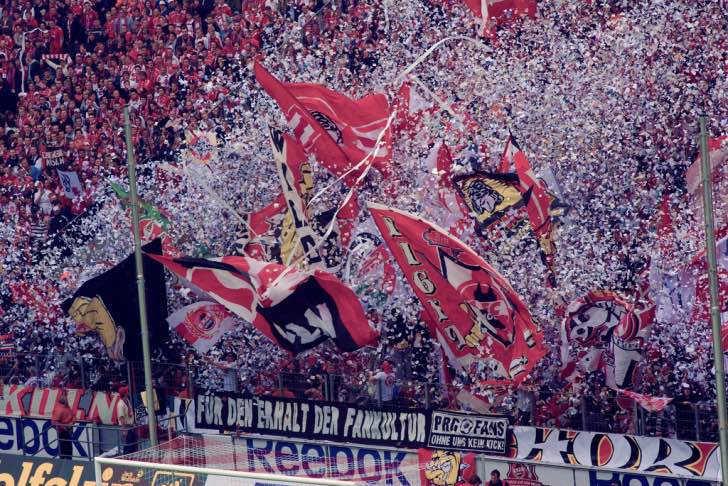
Dustin Liebenow / Flickr.com
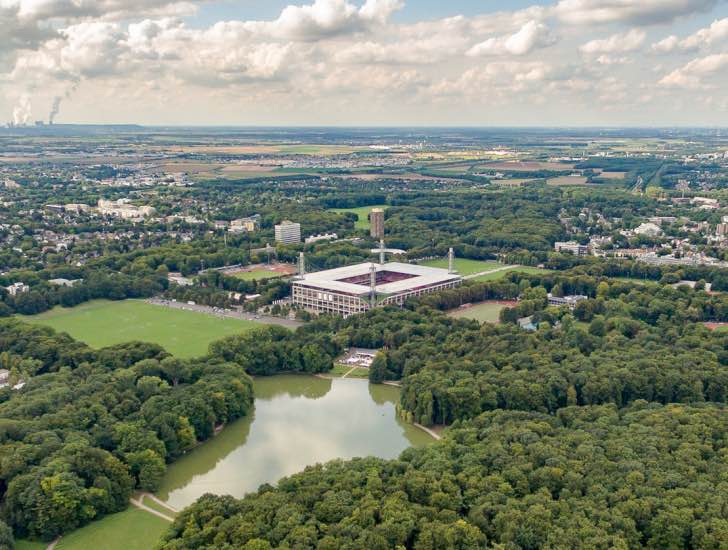
dronepicr / Flickr.com
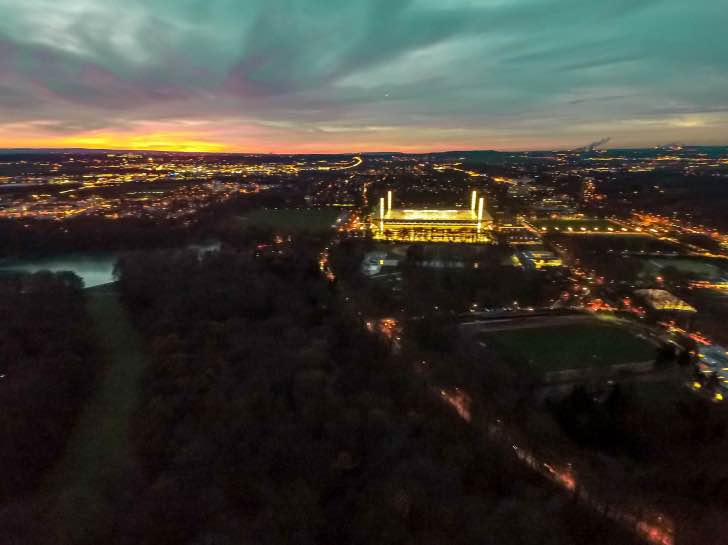
Marco Verch / Flickr.com
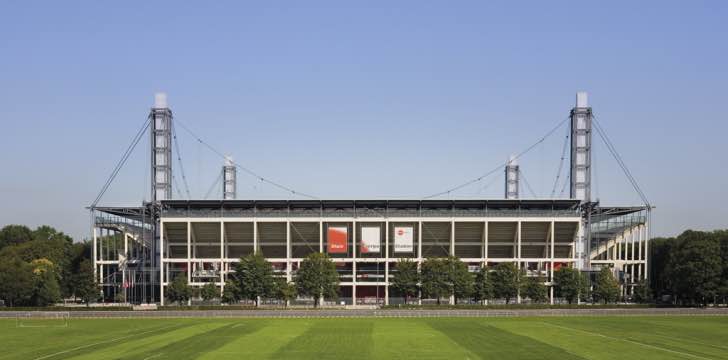
HOPPE - Der gute Griff. / Flickr.com
RheinEnergieStadion Seating Plan and Where to Sit
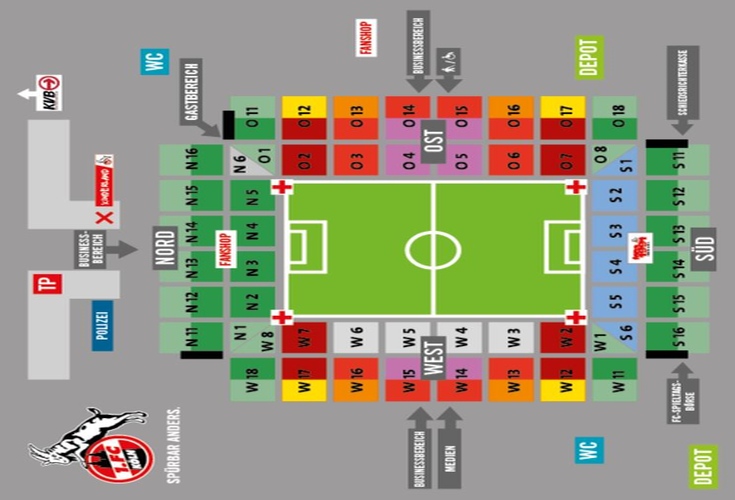
RheinEnergieStadion is designed in a more traditionally English style of having four separate stands rather the continental style of a continuous bowl of seating. The North and South stands are behind the two goals, whilst the East and West Tribunes run along the side of the pitch. The West Tribune is what would typically be considered as the main stand, featuring the dugouts and executive boxes.
FC Cologne Ticket Prices
How much you’ll pay for your ticket depends on a number of things. How old are you? Where in the ground would you like to sit? What competition is it that you’re heading to watch? As an example, if you’d gone to see Cologne play Hamburg in 2017 you’d have paid anywhere between €9.50 and €65 depending on the answers to those variables.
How To Get FC Cologne Tickets
As with most major football clubs in Europe, the best place to head for tickets to Cologne matches is the club’s official website. There is also a phone number that you can call and the staff usually speak English, or if you’d rather than you’ll likely be able to get a ticket at the stadium directly if the match is against a less popular opposition.
Where to Buy
Getting To RheinEnergieStadion
Train – It takes about eleven hours to get the train from London to Cologne, normally going via Brussels. Once you’re in the city you’ll have around five miles to travel to get from the city centre to the ground. The best way to get to the stadium is probably by tram, with special ones put on from the Hauptbahnhof Train Station to the ground on match days. You can also get Tram 1 from Neumarkt Station.
Bus – Not everyone likes to get the tram, so if you’d rather get a bus then number 143 stops within walking distance of the RheinEnergieStadion.
Car – The main roads that run closest to the stadium are the A1 and the A4, but if you’d like more specific information than that then you might want to get a sat-nav or something.
By Air – Cologne/Bonn Airport is the closest to the centre of the city, located less than fifteen miles away.
Taxi – A taxi from the centre of Cologne out to the ground will take about twenty minutes, traffic depending. It will cost you somewhere between €15 and €20.
Parking Near RheinEnergieStadion
There are about seven and a half thousand car parking spaces at the ground. Not a huge amount considering the number of people that can attend matches, so you might want to have a look around the local area to see if there are any spaces without parking restrictions.
Useful Resources
RheinEnergieStadion Hotels
Cologne is a big place and as such boasts plenty of good hotels.
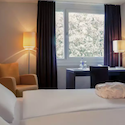
Mercure Hotel Köln West - £60+
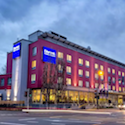
Dorint Hotel Köln Junkersdorf - £70+
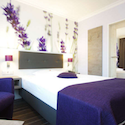
Garten-Hotel Ponick - £85+
Pubs and Bars Near RheinEnergieStadion
If you can’t find somewhere to buy a bier in Germany then you aren’t looking very hard!
Barney Vallelys Irish Pub
Joe Champs
My Way
Facilities
Not only do the stadium provide plenty of places to eat, drink, and relieve yourself, but sight lines are excellent and there is even a stadium map dedicated to the different types of food you can buy and where they are. Tasty.
Hospitality
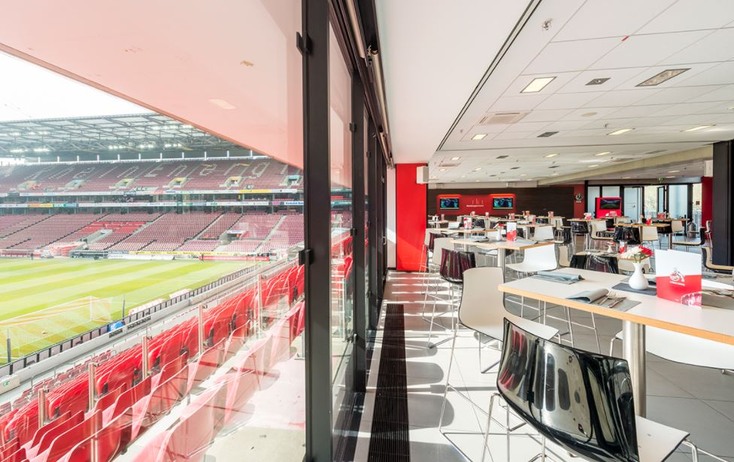
There are 48 VIP lounges located within the RheinEnergieStadion, so if you’re hoping to find somewhere exciting to watch Cologne matches then you’re in luck. There are three additional event and incentive lounges, along with 18,000 business seats and a stadium restaurant.
Private Hire
Motivational workshops, company meets, personal celebrations; there are many different events you might wish to host at the RheinEnergieStadion and if you wish to do so then get in touch with the club who can tell you more.
Stadium Tours & Museum
Tours at the Rheinenergiestadion promise access to the most exclusive areas of the ground and plenty of technical data and inside info from the tour guide. You’ll pay €11.50 as an adult and a random €7.10 as a child, whereas a family of 2 adults and 2 children costs €22.10. There’s a museum at the ground too.
About FC Cologne
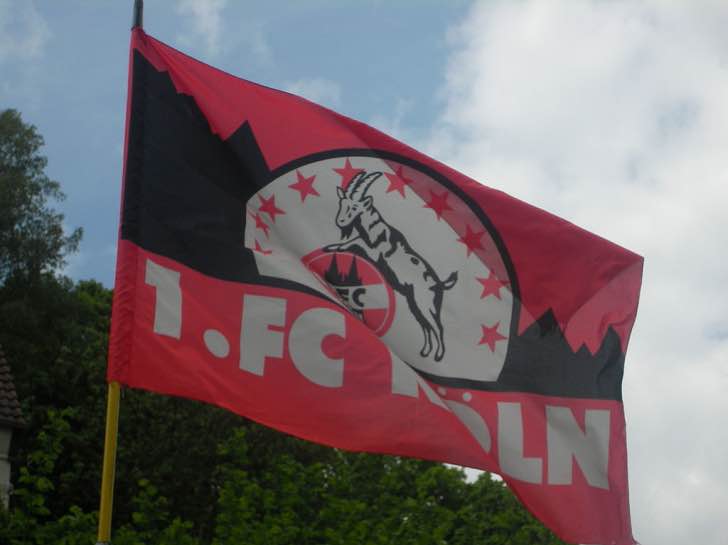
1. FC Köln was founded in 1948 when two other clubs were merged together, namely Kölner Ballspiel-Club 1901 and SpVgg Sülz 07. The club began to play its matches in the Oberliga West and it didn’t take long for them to gain some success; they won their divisional title in 1954. When the new Bundesliga was created in 1963, 1. FC Köln was one of the first sixteen teams to play in it. Once again it didn’t take long for the club to enjoy some success, winning the inaugural Bundesliga season and gaining the right to play in the next season’s European Cup. They played Liverpool in the quarter-final but nothing could separate the two sides after three matches and, because penalties hadn’t been invented then, Köln went out on the toss of a coin!
The club has enjoyed almost as much success as disappointment over the years, winning four DFB-Pokals, but reached the final without emerging victorious six times; although they have won the Bundesliga four times and only finished as runners-up once. Perhaps the most frustrating thing for the Cologne when it comes to the DFB-Pokal finals that they missed out is the fact that they reached final three times in the 1970s but lost every match. Having said that, in 2002 the club failed to score a goal for more than eleven and a half games, setting an unwanted Bundesliga record in the process. One other thing worth mentioning about Cologne is the fact that, like many German clubs, it’s not just a football team. 1. FC Köln is a sports club, also including handball, table-tennis and gymnastics clubs.
RheinEnergieStadion History
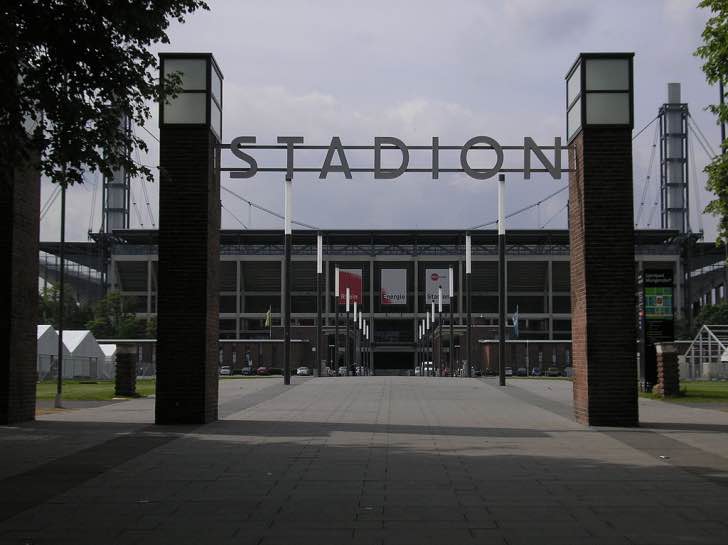
If 1. FC Köln’s history is a convoluted one then that’s as nothing compared to the club’s home ground. It originally opened in 1923 under the name Müngersdorfer Stadion, costing just shy of 48 million Deutsche Mark to build. Its opening not only gave the city of Cologne more prestige in Germany but it also brought the region more sporting success. It’s difficult to know what the first official match was at the stadium, but it hosted its first international match in 1927 when the Netherlands came to play Germany. The national side has only lost once when they’ve played at the ground, which is pretty impressive!
When the stadium opened in 1923 it was originally a running track, something that allowed them to invite non-sports people to run on the track when they held meets there. In 1929 over 38,000 people turned up to one such meet. In 1972 the stadium was completely renovated, with the process taking three years to complete. It was renovated again from 2002 until 2004, getting it ready to host five matches for the 2006 FIFA World Cup. The renovation that took place after the turn of the millennium did not put the running track back in place, instead allowed the supporters to be much closer to the pitch and therefore the action of the game.
Future Developments
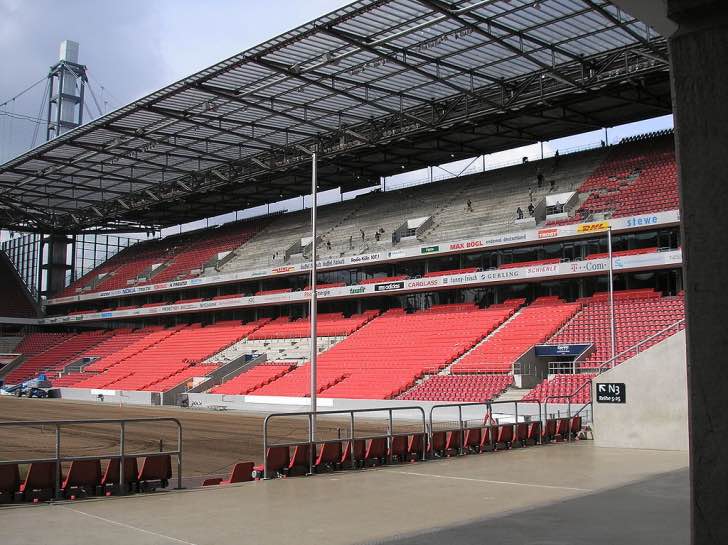
There has been a plan for some time to add 25,000 seats to the RheinEnergieStadion, though nothing concrete has been put in place to do that as of yet. Obviously if anything changes on that front then we’ll let you know.
